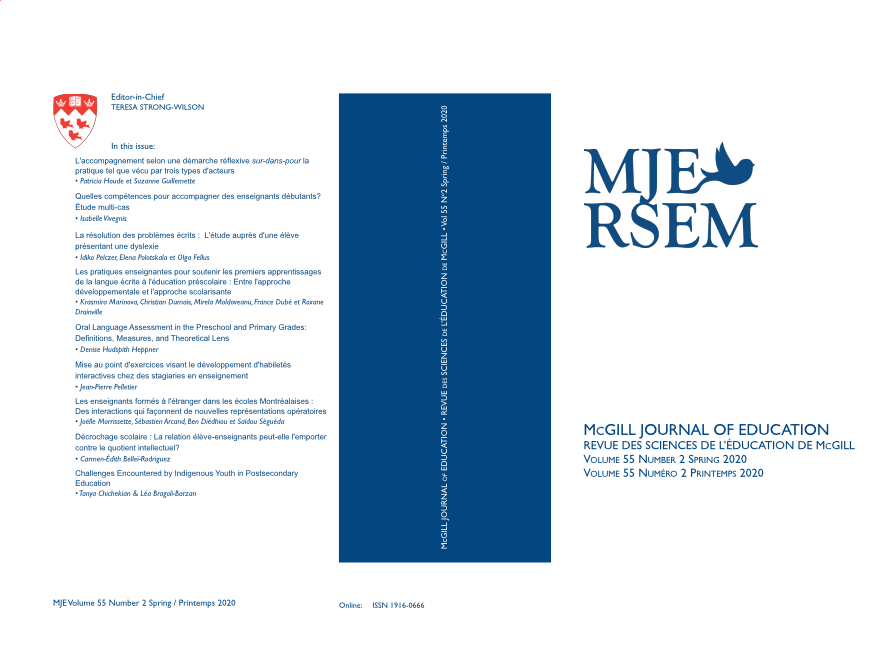WORD PROBLEM-SOLVING: THE CASE OF A STUDENT WITH DYSLEXIA
Keywords:
elementary school teaching, dyslexia, mathematics teaching, relational reasoning, word problem resolutionAbstract
In our previous studies, we developed an approach to teaching problem-solving we termed Equilibrated Development that allows students to better understand the quantitative relationships that arise in a mathematical problem and to better choose a solution strategy. We used the method of a teaching experiment to evaluate the applicability of the developed approach to cases of students with dyslexia and to modify it, if necessary, to meet these students’ needs. Our data suggest that: a) the understanding of the mathematical structure of a problem is independent of the student's basic numerical knowledge, and b) there are conditions that allow a dyslexic student to develop mathematical reasoning to solve written problems despite difficulties in reading and writing of numbers and text.
References
Bednarz, N. et Janvier, B. (1993). The arithmetic-algebra transition in problem solving: Continuities and discontinuities. Proceedings of the 15th Annual Meeting of the International Group for the Psychology of Mathematics Education (North American chapter), 2, 19–25.
Boote, S. K. et Boote, D. N. (2016). ABC problem in elementary mathematics education: Arithmetic before comprehension. Journal of Mathematics Teacher Education, 21(2), 99–122. https://doi.org/10.1007/s10857-016-9350-2
Davydov, V. V. (2008). Problems of developmental instruction: A theoretical and experimental psychological study. Nova Science.
Deshaies, I., Miron, J. M. et Masson, S. (2015). Comprendre le cerveau des élèves pour mieux les préparer aux apprentissages en arithmétique dès le préscolaire. Approche Neuropsychologique des Apprentissages chez l’Enfant [ANAE], 27(134), 39–45. http://www.labneuroeducation.org/s/Deshaies2015.pdf
Fédération des syndicats de l’enseignement (FSE). (2013). Référentiel. Les élèves à risque et HDAA.
Jupri, A. et Drijvers, P. (2016). Student difficulties in mathematizing word problems in algebra. Eurasia Journal of Mathematics, Science & Technology Education, 12(9), 2481–2502. https://doi.org/10.12973/eurasia.2016.1299a
Mancl, D. B. (2011). Investigating the effects of a combined problem-solving strategy for students with learning difficulties in mathematics (publication n°927) [thèse de doctorat, University of Nevada]. UNLV Theses, Dissertations, Professional Papers, and Capstones. http://dx.doi.org/10.34917/2268935
Ministère de l’Éducation, du Loisir et du Sport (MELS). (2001). Programme de formation de l’école québécoise. Éducation préscolaire. Enseignement primaire. Domaine de la mathématique, de la science et de la technologie. http://www.education.gouv.qc.ca/fileadmin/site_web/documents/PFEQ/prform2001-062.pdf
Ministère de l’Éducation, du Loisir et du Sport (MELS). (2009). Document d’accompagnement. Progression des apprentissages : Mathématique. http://www.education.gouv.qc.ca/fileadmin/site_web/documents/education/jeunes/PDA-mathematique-1cycle-primaire.pdf
Neef, N. A., Nelles, D. E., Iwata, B. A. et Page, T. J. (2003). Analysis of precurrent skills in solving mathematics story problems. Journal of Applied Behavior Analysis, 36(1), 21–33. https://doi.org/10.1901/jaba.2003.36-21
Peters, L., Bulthé, J., Daniels, N., Op de Beeck, H. et De Smedt, B. (2018). Dyscalculia and dyslexia: Different behavioral, yet similar brain activity profiles during arithmetic. NeuroImage: Clinical, 18(Juillet 2017), 663–674. https://doi.org/10.1016/j.nicl.2018.03.003
Polotskaia, E. et Freiman, V. (2016). Technopédagogie et apprentissage actif. Bulletin AMQ, LVI(3), 55–69. http://www.amq.math.ca/wp-content/uploads/bulletin/vol56/no3/07-contribution-appuyer-apprentissage.pdf
Polotskaia, E. et Savard, A. (2018). Using the relational paradigm: effects on pupils’ reasoning in solving additive word problems. Research in Mathematics Education, 20(1), 70–90. https://doi.org/10.1080/14794802.2018.1442740
Savard, A., et Polotskaia, E. (2017). Who’s wrong? Tasks fostering understanding of mathematical relationships in word problems in elementary students. ZDM Mathematics Education, 49(6), 823–833. https://doi.org/10.1007/s11858-017-0865-5 Schliemann, A. D., Liu, C., Carraher, D. W et Teixidor i Bigas, M. (2017, 3-5 avril). If y = 3x, is y greater than x? Teachers evolving understanding of operations on quantities [communication orale]. NCTM 2017 Research Conference, San Antonio, TX. https://www.researchgate.net/publication/333277530_If_y_3x_is_y_greater_than_x_Teachers_Evolving_Understanding_of_Operations_on_Quantities.
Simmons, F. R. et Singleton, C. (2008). Do weak phonological representations impact on arithmetic development? A review of research into arithmetic and dyslexia. Dyslexia, 14(2), 77–94. https://doi.org/10.1002/dys.341 .
Steffe, L. P. et Thompson, P. W. (2000). Teaching experiment methodology: Underlying principles and essential elements. Dans R. Lesh et A. E. Kelly (dir.), Research design in mathematics and science education (p. 267–307). Erlbaum.
Theis, L., Morin, M., Koudogbo, J., Tambone, J. et Marchand, P. (2014). Quelles fonctions potentielles d’un dispositif d’aide pour soutenir la résolution d’une situation-problème mathématique chez des élèves en difficulté du primaire? Éducation et Francophonie, XLII(2), 158–172. https://doi.org/10.7202/1027911ar
Thompson, P. W. (1993). Quantitative reasoning, complexity, and additive structures*. Educational Studies in Mathematics, 25(3), 165–208.
Vergnaud, G. (2009). The theory of conceptual fields. Human Development, 52(2), 83-94. https://doi.org/10.1159/000202727
Vygotsky, L. S. (1983). Osnovy Defectologii [Fondamentals of defectology]. Pedagogika.
Wagner, S., Mitchell, Z. et Goldin-Meadow, S. (2008). Gesturing makes learning last. Cognition, 106(2), 1047–1058. https://doi.org/10.1016/j.cognition.2007.04.010
Westwood, P. (2011). The problem with problems: Potential difficulties in implementing problem-based learning as the core method in primary school mathematics. Australian Journal of Learning Difficulties, 16(1), 5–18. https://doi.org/10.1080/19404158.2011.563475
Downloads
Published
Versions
- 2021-09-02 (3)
- 2021-09-02 (2)
- 2021-07-11 (1)
How to Cite
Issue
Section
License
Copyright (c) 2021 McGill Journal of Education / Revue des sciences de l'éducation de McGill

This work is licensed under a Creative Commons Attribution-NonCommercial-NoDerivatives 4.0 International License.



